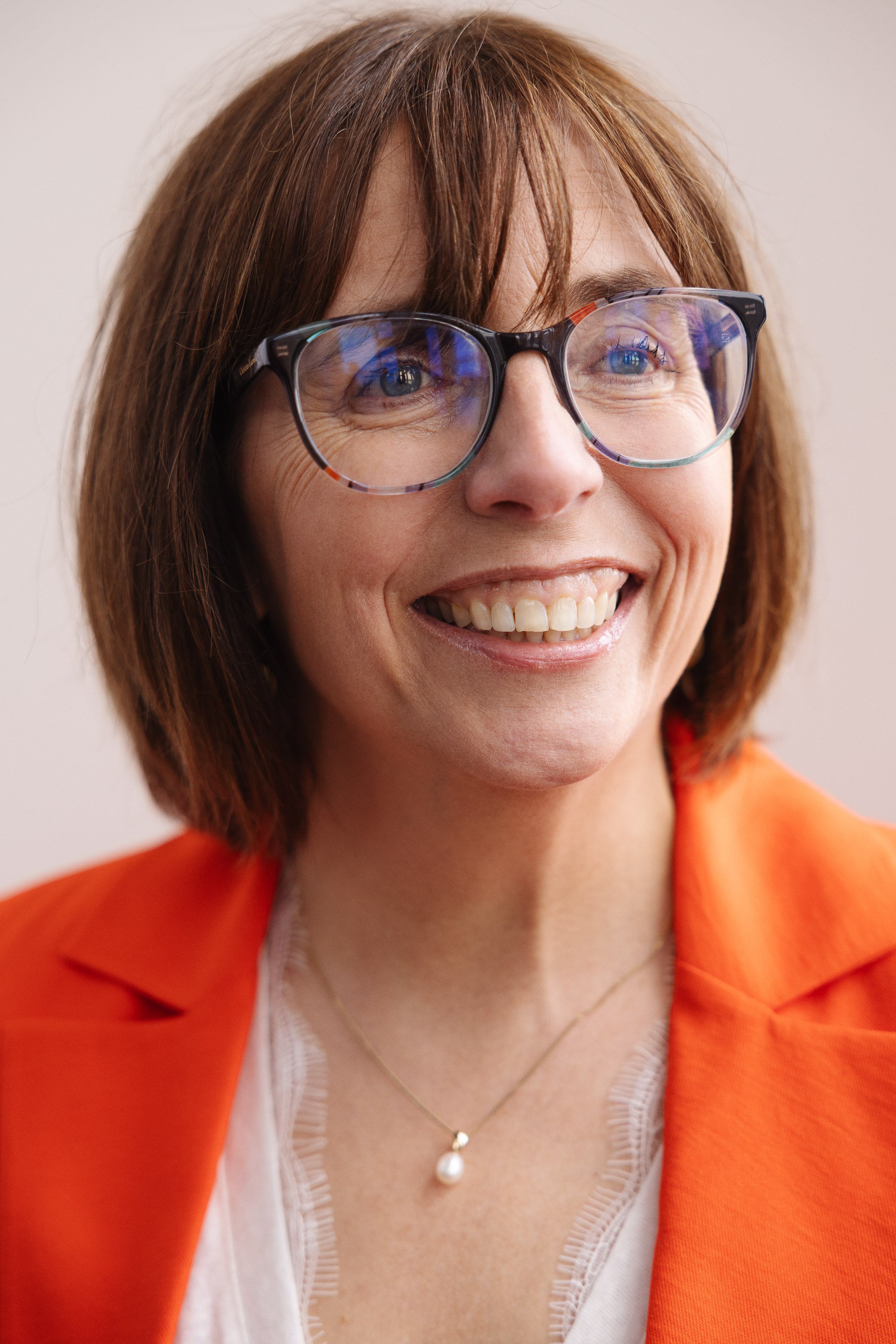DRAWING HER
SWORD
Alison Dunn
The journey from leaving school with no qualifications to becoming a lawyer would be remarkable enough for most people, but for Alison Dunn it was just the start. Now, as chief executive of Society Matters and Citizens Advice Gateshead, she is working to make a difference for thousands of people every year. We talk about her career and her motivations.
Interview by Arlen Pettitt
Photographs by Christopher Owens
“My earliest memory of social justice is as a child at primary school,” Alison Dunn says early in our conversation.
Two children in her class were constantly being bullied, one had a learning disability and the other was Chinese - a rarity in the North East in the 1970s - and Alison remembers putting herself between them and the bullies.
“An adult said to me ‘you do realise if you continue to play with those girls, no one will want to be your friend?’ and I couldn't have been any more than six years old, but I absolutely knew that that wasn't right,” she recalls. “It made me even more determined to be their friend.”
Dunn describes herself as great at defending other people and rubbish at defending herself, but that doesn't quite ring true when she explains how often she's stood her ground, or advocated for herself, in her career.
“All throughout my legal career, nobody had talked to me about the reasons why somebody might shoplift. I'd processed them through their shoplifting charge, but I'd never stopped to think about why they might have done that.”
Having left school at 16 with no qualifications, Alison managed to talk her way into an office junior role with a law firm.
After a couple of weeks, having got to know some of the lawyers, she was furious to discover they weren't all privately educated as she had previously assumed.
“I remember feeling really quite cross about the fact nobody had taken the time to make that visible to me,” Alison says. “Nobody ever had that conversation with me about whether it was an option.”
She enrolled in night school, got her GCSEs, then A Levels, then persuaded the law firm to put her through day release and qualified as a lawyer.
She went on to work in private practice for a decade.
That self-belief has been evident throughout Dunn’s career.
After starting a family, Dunn became increasingly disillusioned with balancing work and life, and she decided to take a year out after the birth of her third child.
But, about six months in, she started to get itchy feet and decided to look for part time work.
“I decided rather arrogantly that I would get a job in a charity,” she says, “and that they'd be really lucky to have my fantastic skills as a lawyer.”
A few unsuccessful interviews later - interviewers didn’t always take kindly to a feeling Dunn was after their job - she landed a role two days a week with Citizens Advice as a money advice worker.
It was a revelation, and Alison suddenly had a far deeper understanding of the difficulties some people face.
“All throughout my legal career,” she says, “nobody had talked to me about the reasons why somebody might shoplift. I'd processed them through their shoplifting charge, but I'd never stopped to think about why they might have done that.”
“Nobody ever talked to me about adverse childhood experiences and how that could lead to addictions around drugs, alcohol and gambling,” she continues. “Nobody ever talked to me about the vulnerability of being a victim of domestic violence, but actually also how often perpetrators have experienced trauma in their own life.”
Getting beyond the theory into the human realities of the issues she’d dealt with previously as a lawyer became a passion.
Those two days a week with Citizens Advice became three days, then four, then she was made supervisor, then manager, and Alison was CEO of Citizens Advice Gateshead within four or five years.
She’s now been in that role for 12 years.


“The people that were poor are now destitute. The people that were middle earners and were doing okay are now experiencing poverty.”
Citizens Advice is a brand that most people in the UK would recognise but what they might not know, Dunn explains, is that each one is different.
Each branch of Citizens Advice would offer the same core services around welfare and benefits, money advice and housing support, but they then tailor their offer to the local area and often deliver other contracts on behalf of government or local authorities.
Citizens Advice Gateshead, for example, is part of a larger group called Society Matters, and delivers national shared services for Citizens Advice, as well as contracts for a range of other bodies including the Ministry of Justice.
Through Society Matters, Alison and the team have been working directly with employers, including a project funded by the North East Combined Authority aimed at helping businesses understand how their workforce have experienced the cost of living crisis.
“Most of the people that come in to see us now are in work,” Dunn says, “and people who prior to the cost of living crisis would have been considered to have a reasonable wage, their mortgages have gone up and it's literally wiping out any resilience that they may have had in their budgets.”
The result is a whole new tranche of people at risk of being plunged into poverty.
“The people that were poor are now destitute,” she continues. “The people that were middle earners and were doing okay are now experiencing poverty.”
Dunn's choice of word ‘destitution’ matches the conclusion of others working in her sector, including the poverty-focused think tank the Joseph Rowntree Foundation (JRF) who last year estimated 3.8 million people in the UK fell into that category.
The almost Victorian descriptor is defined by JRF as “struggling to afford to meet their most basic physical needs to stay warm, dry, clean and fed.”
The scale of the problem has increased dramatically, with the number of people impacted up two-and-a-half times since 2017.


For those who have been dragged into poverty, Society Matters and their work with employers can’t fix the fundamental issues. Problems with low pay and poor public services are too endemic - but it can make a big difference through working “to make sure that their policies, processes, and ways of working are as sympathetic as possible towards the clients that we see.”
In practice this means things like genuine flexibility in the way people work, extra support for people with disabilities or mental health conditions, or better acknowledgment of the impact of caring responsibilities.
On money and pay specifically, Alison gives a couple of examples where greater awareness can help employers make better decisions for their staff.
At Christmas, employers might pay staff early as a goodwill gesture, but this act of kindness can take individuals through the thresholds for Universal Credit, and kick off a process of recalculation and negotiation which can take months to unravel.
Likewise, paying expenses the following month essentially requires staff to bankroll the business for a number of weeks - especially where the costs incurred are for essentials like travel or materials. It’s better, Society Matters suggests, to have an option to use pre-payment cards to cover these costs.
“There is £60 million in unclaimed benefits in Gateshead alone - £23 billion across the UK as a whole. That is money, which is not just about people not working, there's in-work benefits, there's disability benefits.”
Dunn ties all of their work back to opportunity and economic impact.
It’s difficult to succeed in life when you start from a low base, leaving school with few qualifications, and without access to a network which helps you build a career.
It’s even harder if you haven’t been able to access the benefits you’re entitled to.
Righting that wrong, and getting people what they are eligible for, has a huge impact.
In the last financial year the Society Matters group helped people access £27.3 million in additional income, and in Alison’s 12 years as chief executive they’ve pulled down more than £100 million extra for the people of Gateshead.
“It comes from things like unclaimed benefit, backdated benefit awards, tribunal awards, compensation payments, applications for charitable assistance, and debts written off,” Dunn explains.
It’s pounds, shillings and pence in people’s pockets, she says, which tends to be spent locally, and allow people to engage with their community, as well as get greater autonomy over their lives.
The average additional income is around £1,200 for the 20,000 people Citizens Advice Gateshead and the Society Matters Group help every year, but in some cases the gain can be up to £20,000 for a household.
One of the great challenges for Citizens Advice is the variations across different areas, and the way in which their geography increasingly doesn’t match the world of NHS Integrated Care Boards and devolved Mayoral Combined Authorities.
The result is a different service for someone in Blyth compared to Bensham, or Shiremoor compared to South Hylton.
But, as ever, the solution is in understanding the world better, and through the Society Matters arm, Alison’s team works closely with partners in the public sector, and with major employers across the North East and nationally.
“I never get sick of drawing my sword. I mean, honestly, I'm probably very annoying because I just get up every day and I'm ready for it. Absolutely ready for it.”
Even with all the work they’ve done, there’s room to go further.
“There is £60 million in unclaimed benefits in Gateshead alone,” Dunn says. “£23 billion across the UK as a whole. That is money, which is not just about people not working, there's in-work benefits, there's disability benefits.”
Alison goes on to say there are five-and-a-half thousand older people in Gateshead entitled to pension credit but not claiming it, with 300 of those also entitled to housing benefit.
What’s standing in the way, I ask.
“There's definitely a lack of awareness,” Dunn explains. “There's an assumption that you won't meet the eligibility criteria. An assumption that it's just gonna be too hard for the reward that you're gonna get. But there's also still a stigma attached to benefit.”
This is all compounded by a mistrust of government agencies, the complexity of a system which can feel designed to put you off, and a failure to draw lines between individual queries and points of engagement and an individual’s wider experience.
“Every touch point somebody has with a government agency should involve an offer of bringing awareness about what people are entitled to,” Alison says.
“What'll happen is someone will ring up about a specific benefit,” she continues, “they'll get that question answered, but nobody will talk to them and say ‘but, do you know you're also entitled to x, y, and z?’”
Dunn hopes devolution will help change that, through better coordination and seeing how the work Society Matters does is closely aligned with efforts to improve opportunity and tackle poverty in the North East.


But, what’s next for Dunn herself?
“Retirement doesn’t sound very inspiring, does it?” she says.
Dunn doesn't seem short of the drive that's been the hallmark of her career.
She talks about wanting to put Citizens Advice Gateshead and Society Matters on as strong a footing as possible, and the power of working together out of a belief that there's plenty of resources and potential out there, if we could get it to the right places - “a mindset of abundance”, as she calls it.
“I never get sick of drawing my sword,” Dunn says emphatically. “Never ever. I mean, honestly, I'm probably very annoying because I just get up every day and I'm ready for it. Absolutely ready for it.”
While never losing sight of the transformational value of local work in Gateshead, Dunn sees an increasing role for Society Matters at a regional and national level.
“If we want to shift the dial in terms of poverty, inequality and disadvantage,” she explains, “we have to be part of a regional story, not a local one. That local work is really important, and that work that we do one-to-one with individuals is transformational for those individuals, but it's influencing the policy, the process, the ways of working that will shift the dial for the masses.”






